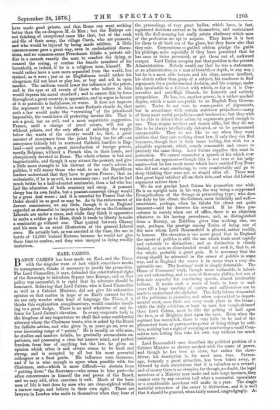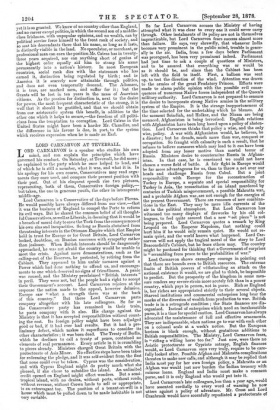EARL CAIRNS. B ARON CAIRNS has been made an Earl, and
the Times, with the singular want of tact which sometimes marks its management, thinks it necessary to justify the promotion. The Lord Chancellor, it says, defended the constitutional right of the Sovereign to introduce Sepoys into Europe, and as that policy was successful, it is right that its advocate should be honoured. Believing that Lord Cairns, who is Lord Chancellor as well as a Cabinet Minister, did not give his exhaustive opinion on that matter in hope of an Earl's coronet for fee, we can only wonder what kind of language the Times, if it thinks this explanation complimentary, would consider insult- ing to a great Judge. There is no need whatever of any de- fence for Lord Cairns's elevation. In every corporate body in the kingdom of any importance we shall find some confidential attorney whom the Chairman trusts, who is asked by the Board for definite advice, and who gives it, as years go on, over an over increasing range of "points." He is usually an able man, he studies and masters details, he gradually accumulates ex- perience, and possessing a clear but narrow mind, and perfect freedom from fear of anything but the law, he gives an opinion which often is and always seems to be hard and strong, and is accepted by all but his most powerful colleagues as a final guide. His influence soon increases, and if he is wise enough to agree when possible with the Chairman, and—which is more difficult—to abstain from "putting down" the Secretary—who seems to him pert—he often concentrates in himself the real power of the Board, and we may add, often exercises it well. Much of the busi- ness of life is best done by men who are clear-sighted within a narrow range, and believe in their own sight. There are lawyers. in London who smile to themselves when they hear of the proceedings of very great bodies, which have, in fact, registered decisions arrived at by themselves, and maintained with the dull-seeming but really astute obstinacy which men of the profession are apt to acquire. They know it is best for them to sit back out of the glare, but they know also that they rule. Corporations so guided seldom grudge the guide his pickings, more especially if they have perceived that he has once or twice prevented, or got them out of, awkward scrapes. Lord Cairns occupies just that position in the present Administration. Nobody would say that he was a statesman, or an administrator, or a man of breadth or depth, in any way ; but he is a most able lawyer, and his clear, narrow intellect, his clutch rather than grasp of a subject, his readiness to find arguments for a predetermined decision, and his courage, make him invaluable to a Cabinet with which, so far as it is Con- servative and anti-High Church, he honestly and entirely sympathises. He has, too, another power, in a rather marked degree, which is most acceptable to an English Tory Govern- ment. Tories do not vote in consequence of arguments, but in accordance with certain stubborn prejudices—many of them most useful prejudices—and tendencies ; but they wish to be able to defend their action by arguments good enough to use. They despise intellect and reason alike, but they do not like to be always intellectually defeated, or to be pronounced unreasonable. They do not like to say when they want soldiers that they care nothing about law, if only they can find bayonets, though that is their inner feeling, but wish for a plausible argument, which sounds reasonable and comes to precisely the same thing. Lord Cairns supplies this want in perfection. We cannot remember a speech of his which ever convinced an opponent—though this is not true of his judg- ments—but he has made many which have enabled Tory Peers who did not want convincing, to vote comfortably and go to sleep thinking they were not so stupid after all. There was that great legal intellect all on their side, and what did Liberal argument matter then I We do not grudge Lord Cairns his promotion one whit. He is an upright man in his way, the way being a suppressed Evangelicalism of the Orange or persecuting type ; who does his duty by his client, the Cabinet, most faithfully and well— sometimes, perhaps, when he thinks his client not quite innocent—and he deserves his reward. If he likes pre- cedence in society when out of office, there is no objection whatever to his having precedence, and, as distinguished from a Barony, an Earldom gives him nothing else, ex- cept, perhaps, the prestige among Tories of being one of the men whom Lord Beaconsfield is pleased, rather tardily, to honour. His elevation is one more proof that in England the career of politics is still the one which leads most rapidly and certainly to distinction ; and as distinction is clearly desired, or men so clear-headed would not seek it, that is, on the whole, probably a great gain. It is necessary that the strong should be attracted to the career of politics in some way, and in England the career is in many ways a very dis- agreeable one. The hustings' work is simply detestable. The House of Commons' work, though more endurable, is labori- ous and exhausting, and to men of first-rate ability, but not of first-rate capacity for convincing speech, almost intolerably tedious. It seems such a waste of brain to have to wait years till a huge meeting of squires and millionaires can be made to understand the alphabet. The daily labour demanded of the politician is excessive, and when superadded to depart- mental work, soon finds out every weak place in the frame ; while the daily criticism, at least to men less tough-skinned than Lord Cairns, must be like the pelting of hail upon the face, or of Brighton dust upon the eyes. Even when the aspirant has succeeded, there is very little to be had of the pleasantest form of power,—the power of doing things by voli- tion, nothing but a right of worrying or convincing a small Com- mittee into letting him take his own way without too much resistance.
Lord Beaconsfield once described the political position of a Cabinet Minister as slavery mocked with the name of power, and though he has been no slave, but rather the slave- driver, his description is, for most men, true. Patron- age, formerly a great attraction, has been taken away, or fettered by such restrictions that it is valueless as a reward ; and of money there is no overplus, for though, no doubt, the legal members of a Ministry may make and save large incomes, they cannot earn by any exertion half what a successful speculator or a considerable merchant will make in a year. The single material attraction of the career is distinction, and it is well that it should be granted, when fairly earned, ungrudgingly. As yet it is so granted. We know of no country other than England, and no career except politics, in which the second son of a middle- class Irishman, with unpopular opinions, and no wealth, can by political service force himself to the front rank of society, and so seat his descendants there that hie name, as long as it lasts, is distinctly visible in the land. No speculator, or merchant, or professional man can earn the position Mr. Cairns has in twenty- three years acquired, nor can anything short of genius of the highest order equally aid him to stamp his name permanently into a nation's history. In most European countries, social rank dies with the statesman who has earned it, distinction being regulated by birth ; and in America it is scarcely now attainable through politics, and does not even temporarily descend. The Adamses, it is true, are marked men, and suffer for it ; but the Grants will be lost in ten years in the mass of American citizens. As the passion for distinction is, next to the desire for power, the most frequent characteristic of the strong, it is well that it should be gratified, and that we should obtain from our aristocratic system this benefit, in addition to the other one which it helps to secure,—the freedom of all politi- cians from the temptation to corruption. Lord Cairns in the United States might have been a harder Mr. Chandler, and the difference in his favour is due, in part, to the system which receives expression when he is made an Earl.































 Previous page
Previous page